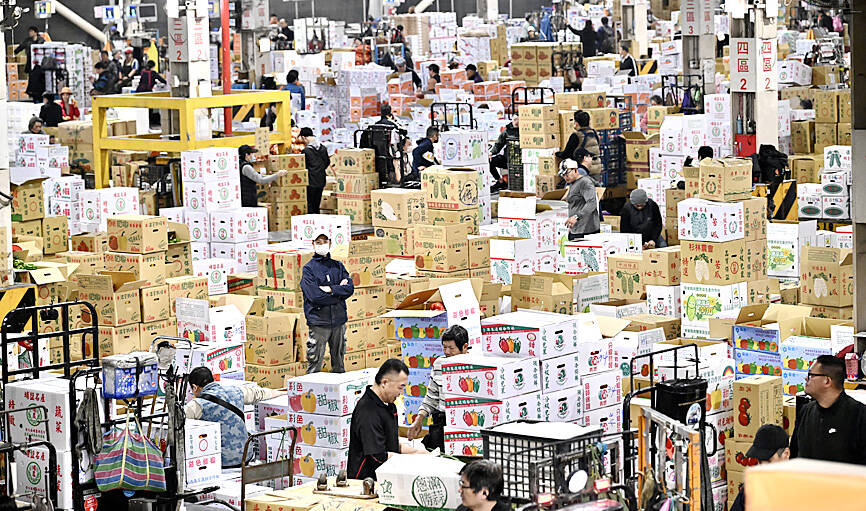Sales generated by Taiwan's wholesale sector increased 8.8 percent year-on-year last year to NT$12.95 billion (US$396.24 million), the highest level on record and reversing the previous year’s decline of 6.9 percent, the Ministry of Economic Affairs said on Thursday.
The growth in the sector’s annual sales beat the ministry’s forecast last month of a 7.9 percent to 8.2 percent increase, ministry data showed.
The increase came as sales last month grew 9.5 percent year-on-year to US$1.17 billion, rising for the 10th consecutive month and exceeding the ministry’s forecast of an increase of 3.5 to 6.5 percent.

Photo: Peter Lo, Taipei Times
The better-than-expected performance was mainly attributable to the machinery equipment industry, which posted a 25.1 percent year-on-year sales increase last month to NT$545.6 million, contributing about 44 percent of the sector’s overall revenue last month, the ministry said.
“The machinery equipment industry has benefited from the booming development of emerging technologies, such as artificial intelligence and high-performance computing,” the ministry said in a report, adding that restocking demand ahead of the Lunar New Year holiday also partly contributed to the sales growth.
As the Lunar New Year holiday falls in January this year, versus February last year, the pharmaceutical and cosmetics industry, and the food, beverage and tobacco industry posted higher sales last month due to restocking ahead of the holiday, increasing 13.5 percent and 3.3 percent year-on-year to NT$64.4 million and NT$133.2 million respectively, the ministry said.
The chemical materials industry also had a strong performance last month, with sales rising 15.5 percent year-on-year to NT$52.3 million, the ministry said, citing recovering demand for industrial chemical materials and a low comparison base a year earlier as the main reasons.
On the other hand, the automotive industry posted a 5.5 percent year-on-year sales decline last month to NT$85.8 million, given less orders from auto distributors and a high comparison base, it said.
For this month, sales for the wholesale sector would post a decline of 3.1 percent to 6.1 percent from last month, as the Lunar New Year holiday reduced the number of working days, the ministry said.
The diffusion index compiled by the ministry — a gauge of firms’ sales expectations for the following month — fell from 50.1 in November to 36.3 last month and was below the threshold of 50, which also suggests a cautious outlook, it added.

When an apartment comes up for rent in Germany’s big cities, hundreds of prospective tenants often queue down the street to view it, but the acute shortage of affordable housing is getting scant attention ahead of today’s snap general election. “Housing is one of the main problems for people, but nobody talks about it, nobody takes it seriously,” said Andreas Ibel, president of Build Europe, an association representing housing developers. Migration and the sluggish economy top the list of voters’ concerns, but analysts say housing policy fails to break through as returns on investment take time to register, making the

EARLY TALKS: Measures under consideration include convincing allies to match US curbs, further restricting exports of AI chips or GPUs, and blocking Chinese investments US President Donald Trump’s administration is sketching out tougher versions of US semiconductor curbs and pressuring key allies to escalate their restrictions on China’s chip industry, an early indication the new US president plans to expand efforts that began under former US president Joe Biden to limit Beijing’s technological prowess. Trump officials recently met with their Japanese and Dutch counterparts about restricting Tokyo Electron Ltd and ASML Holding NV engineers from maintaining semiconductor gear in China, people familiar with the matter said. The aim, which was also a priority for Biden, is to see key allies match China curbs the US

NOT TO WORRY: Some people are concerned funds might continue moving out of the country, but the central bank said financial account outflows are not unusual in Taiwan Taiwan’s outbound investments hit a new high last year due to investments made by contract chipmaker Taiwan Semiconductor Manufacturing Co (TSMC, 台積電) and other major manufacturers to boost global expansion, the central bank said on Thursday. The net increase in outbound investments last year reached a record US$21.05 billion, while the net increase in outbound investments by Taiwanese residents reached a record US$31.98 billion, central bank data showed. Chen Fei-wen (陳斐紋), deputy director of the central bank’s Department of Economic Research, said the increase was largely due to TSMC’s efforts to expand production in the US and Japan. Investments by Vanguard International

STRUGGLING TO SURVIVE: The group is proposing a consortium of investors, with Tesla as the largest backer, and possibly a minority investment by Hon Hai Precision Nissan Motor Co shares jumped after the Financial Times reported that a high-level Japanese group has drawn up plans to seek investment from Elon Musk’s Tesla Inc to aid the struggling automaker. The group believes the electric vehicle (EV) maker is interested in acquiring Nissan’s plants in the US, the newspaper reported, citing people it did not identify. The proposal envisions a consortium of investors, with Tesla as the largest backer, but also includes the possibility of a minority investment by Hon Hai Precision Industry Co (鴻海精密) to prevent a full takeover by the Apple supplier, the report said. The group is